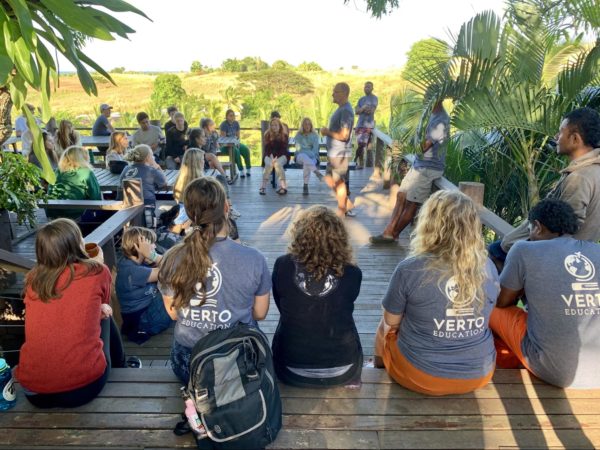
Consider where you come from, what your belief systems are, and how you might grow and change through active listening and understanding of your host culture – it only takes preparation and open-mindedness!
A group of Americans excitedly hops out after experiencing a thrilling ride through the countryside into the small town of Jarabacoa, Dominican Republic. As they file out, chattering loudly in English about “discovering” this new place and the souvenirs they will buy at the nearby gift shop, a pair of older men sit watching in the park. One of them mutters – not so under his breath – “América para los Americanos” (America for the Americans). The man is old enough and wary enough to be sensing a bit of deja vu. Their young visitors are none the wiser.
Positionality is where we stand in relation to dynamics of power and privilege. It is the way that each of us with our unique set of identities (our race, class, religion, gender, sexuality, nationality and ability status) affects our social and political context differently. Positionality also describes how our identities influence, and potentially bias, our perspective on the world. As individuals, we experience our positionality differently in different contexts. We know that learning about identity is critical, but why is it important in the context of a semester abroad?
Most travelers (like our friends described above) are woefully ignorant of their positionality. A crucial part of becoming a global citizen is being self-aware and cognizant of the effect our presence has on our environment. We can do more harm than good if we don’t. Especially when it comes to doing service projects in other countries, a lack of knowledge can perpetuate power imbalances, foster ill will and cause suffering where we only seek to make things better. As global citizens, we can do better. The following are ways students and staff can become more aware of their positionality abroad and thus be more conscientious travelers.
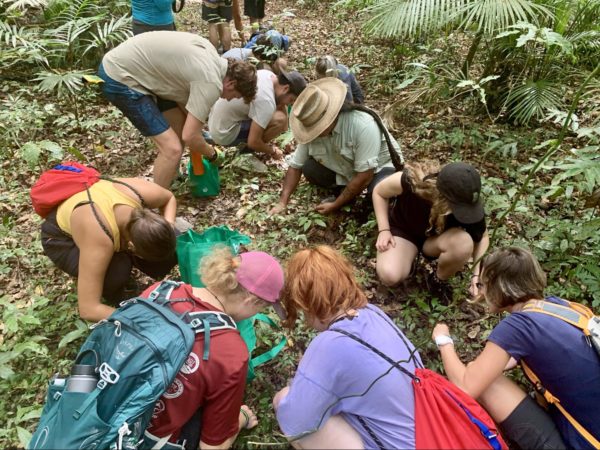
Dig in! Location-based classes are intentionally experiential so that students can not only learn, but participate in the daily activities of their hosts – whether that be harvesting, doing a beach clean up, or helping their hosts cook dinner.
Do your homework.
In previous articles (The Psychology Of Culture Shock & 7 Ways That Well Meaning Staff Do Harm), I emphasized the importance of doing your homework before visiting and living for an extended period in a place – both for staff and students. Beyond learning about your host country’s people and culture, knowing its history is crucial. History created our current context. Our historical memories impact the way we see ourselves and interact with others. Just as Columbus didn’t “discover” America (its people lived and reigned there for millennia before he arrived), the places we are fortunate to visit have long and unique histories of which we should be aware. For example, knowing about the U.S. military interventions that destabilized the Dominican Republic (and a plethora of other Latin American countries) would’ve been useful for our young American friends described above. “America for the Americans” was a term the U.S. government used to justify their many interventions in Latin America – presumably to protect those countries from Spanish Imperialism, but covertly to solidify U.S. dominance in the region. These events happened in the past, but they continue to affect the social, political and economic lives of Dominicans today. If our American friends had known about this, they would have understood why older locals might give Americans the side-eye.
Part of doing your homework is learning from and talking to your local program leaders, instructors and guides who were born and raised in your host country. They are the “experts” that can shed light on local culture and ways of thinking. Most of them are familiar with American culture AND their own culture, so they can translate not only languages, but ideas. Get to know your local program leaders, ask them questions about their lives growing up, their families and what is important to them. Make the most of the interactions you have with locals throughout the program and a whole new world will open up to you.
Confront issues of power, privilege and identity in your own life.
Having conversations about race, class, nationality and gender is not always easy. The natural response when the issue of people’s differences comes up is to shut down or minimize the ways that we are socialized to see ourselves and others. Yet none of us is immune to the forces of socialization and none of us is free of bias. Students and staff should be able to talk about and examine their identities and how they benefit from power structures both in and out of their home country. This is essential in learning how to be accountable for our actions abroad.
Not sure how to talk about identity? Your program leaders and professors will help get the conversation started. They will lead your student group through activities that foster a safe environment to talk about identity. One discussion tool commonly used among staff is “Brave Space”, which sets the tone with some basic agreements about how everyone in the group is expected to treat each other. Brave Space challenges us to push past discomfort while remaining respectful and adopting listening behaviors. The purpose of talking about identity is not to call people out for saying or doing the wrong thing, but to start an uncommon dialogue of empathy, openness and understanding.
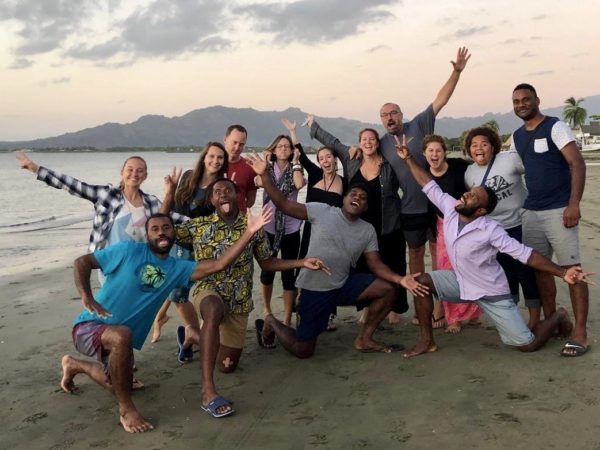
These Fall 2019 students and staff truly acted as travelers, not tourists, and connected through their shared experience
Make connections to power structures at home.
We have a tendency to view issues outside the U.S. as what I call O.P.P. – “other people’s problems”. Yet, the inequality, poverty and strife that exists in your host country also exists in your own home. We need not go very far in our own cities to witness these problems, let alone turn on the news to realize how real they are. Traveling to another country is an excellent way to explore issues that affect all of humanity through the lens of other national and cultural contexts. Seeing how they play out in other cultures gives us a way to talk about how they are similar, yet different at home. More than anything it provides new ways for us to see ourselves and be the change we want to see in the world.
Acknowledge your limitations.
With that said, we will never be able to effectively “fix” other countries. Witnessing extreme poverty is painful. That pain often causes outsiders to want to apply bandaids of hastily conceived solutions. This is referred to as “white saviorism” or the “white savior complex” (although people of color can also be guilty of it). Social media is an inexhaustible source of evidence that the white savior complex is alive and well. The satirical posts of Instagrammer @barbiesavior call attention to the ways outsiders lacking knowledge of their positionality can make all the wrong moves. I have seen many real life Western students who, overwhelmed by the sadness of seeing poverty up close, walk around handing out money, clothing, toys and candy while traveling. These feeble efforts will never end poverty, or even truly improve people’s lives. They are only useful in helping us feel better and perhaps less guilty about our own wealth. As outsiders, we must admit to ourselves that we lack the knowledge necessary to address the systemic causes of poverty elsewhere. The most powerful actions we can take involve partnering with local organizations led by people who are deeply connected to the causes, and thus the solutions of local social issues. These organizations aren’t made up of passive recipients of help, but rather talented people with the ability and desire to make things better in their country. They are from the communities where we are merely visitors and should always be at the helm of any efforts to make sustainable change. The value in cross-cultural education is that we can learn from them how to be allies and activists both domestically and internationally.
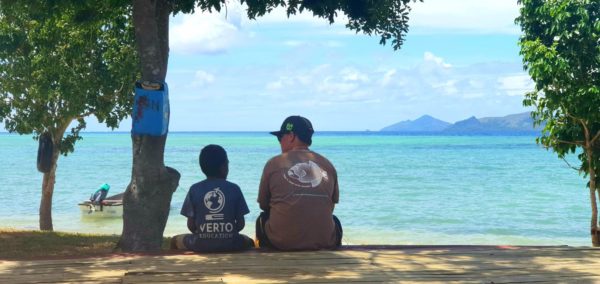
Get curious, ask questions, and listen to the stories of your hosts. Many Verto alumni have said that talking to their hosts – including their host siblings who are eager to share and honest in their curiosity – was the most life-changing part of their experience.
Shift the narrative.
Have you ever stopped to think about why the typical charity or fundraising campaign features half-naked, crying and sick orphan children? Have you seen pictures of “voluntourism” that feature white people prominently in the center of a sea of black and brown faces? Have you ever had a friend who went abroad on a service trip and seemed to be collecting Instagram photos of themselves playing with smiling children in broken-down shacks wearing ragged clothes? These types of images perpetuate stereotypes and oversimplifications of people in poverty. When you see them, you should ask: who is telling this story and how is it being told?
Radi-aid, a Norwegian student organization seeks to challenge the typical narrative and turn it on its head. Their now-famous Youtube music video is a satirical riff that shows Africans across the continent coming together to provide Norwegians with much-needed radiators to help them survive the freezing winters in Norway. One of the goals of Radi-Aid is to “avoid one-sided representation and the single story”. These pioneers in international development believe that there are ways to help without exploiting the suffering of people or playing on people’s guilt. Their guide called “How to get more likes on social media” provides advice for student volunteers and service organizations that work internationally. Some of their tips include: 1) Check your intentions: Ask yourself why you are posting what you’re posting. 2) Avoid taking pictures of people in vulnerable or degrading positions. 3) Gain consent before taking pictures. 4) Portray people in ways that enhance connection, rather than “us” and “them”. 5) Ask people what kinds of stories they would like to tell to the world. 6) Give the names and backgrounds of the people you post about. Travel is a privilege not afforded to everyone. With that privilege comes responsibility. Promoting the dignity of others and reflecting the complexity of the human condition are ways to use your privilege responsibly.
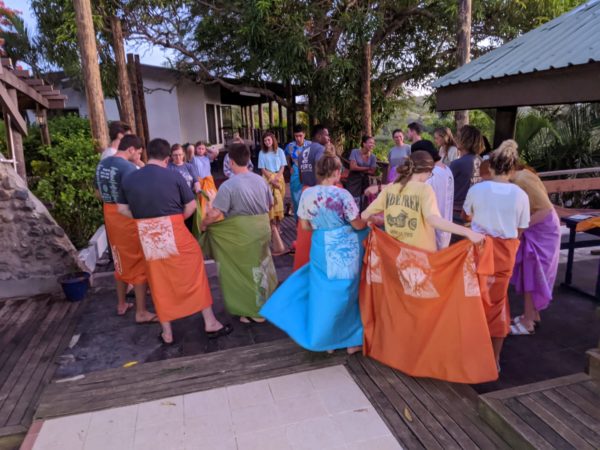
In Fiji, students get used to their “sulus,” the traditional garb that they’ll wear for most of the official visits and events throughout their time in Fiji, taking on the tradition and learning from their hosts.
Let’s roll back that initial scenario, this time with students who are aware of their positionality: A group of Americans excitedly jumps off the back of the pickup truck after experiencing a thrilling ride through the countryside into Jarabacoa. As they file out into the park, a few of them shyly approach the pair of older men they find sitting there. In their best rehearsed but broken Spanish, they ask the men questions they have prepared ahead of time to help them learn more about their culture and their lives. They engage them about the history between their two countries and in doing so, form their first connections with people from this beautiful Caribbean island where they are newcomers. This is not the Monroe Doctrine version of “América para los Americanos”. It is an embodiment of the phrase’s highest and most noble meaning – America belongs to all Americans.

